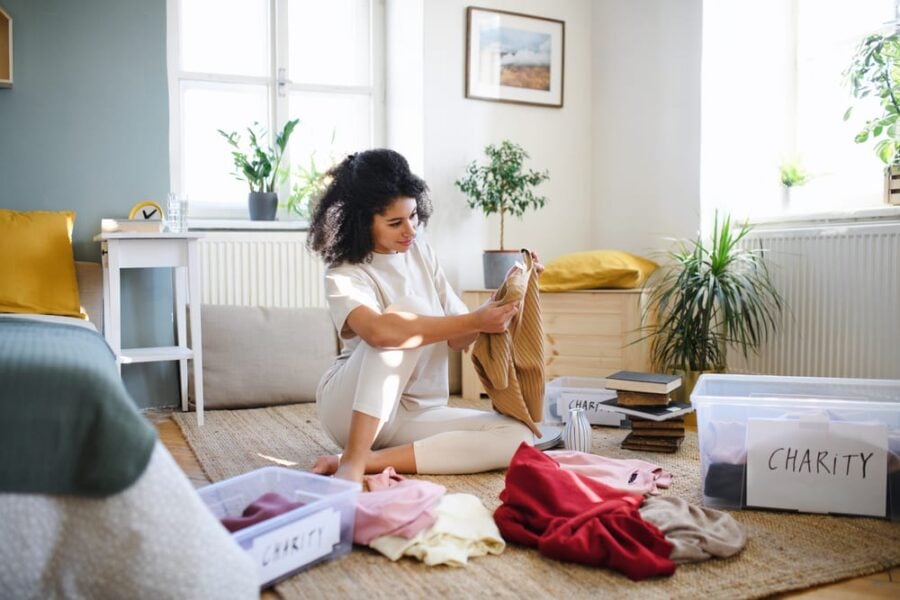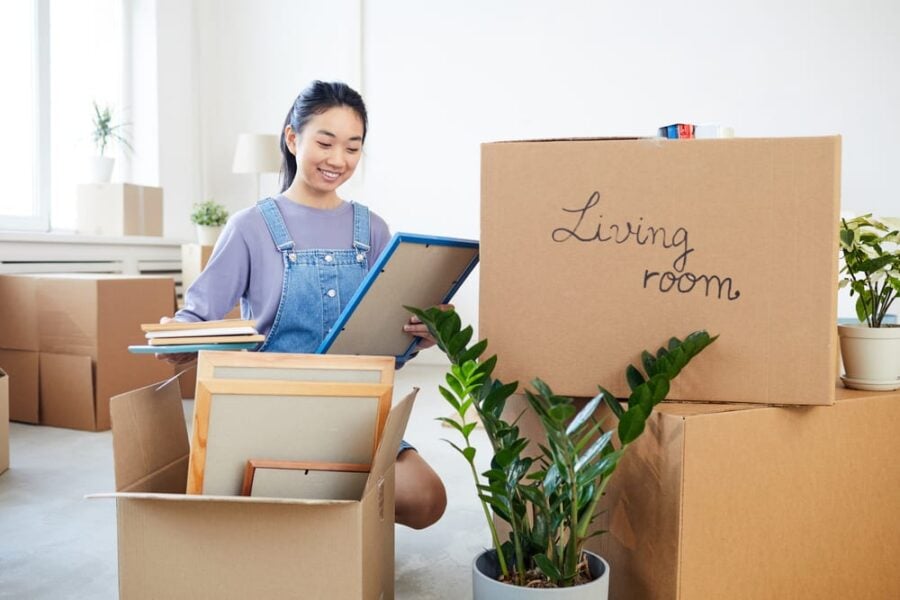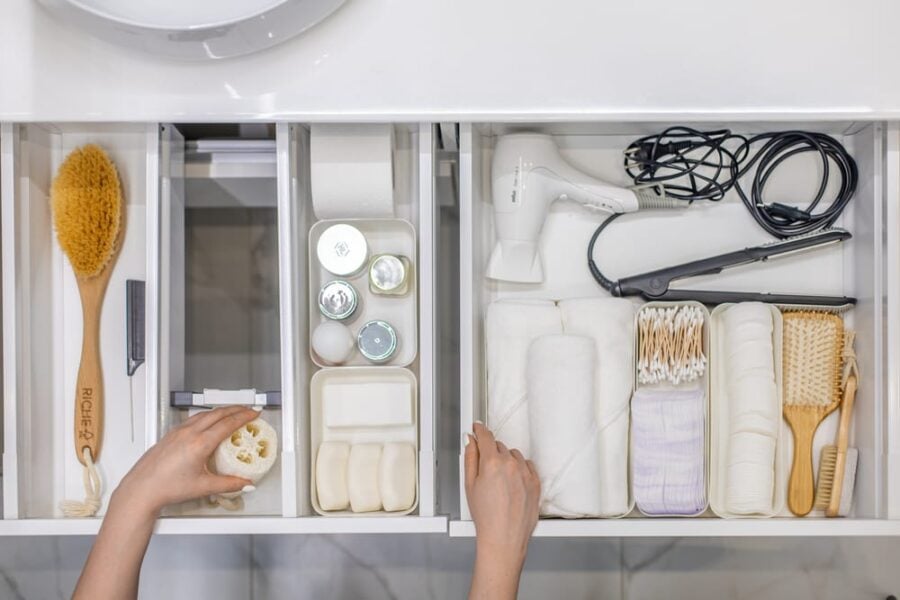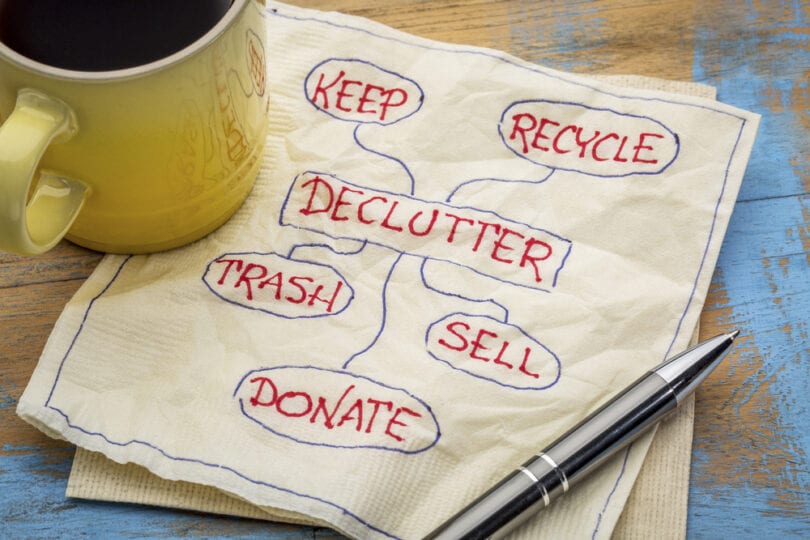It’s the natural order of life: the longer you live somewhere, the more stuff you accumulate. Most of us don’t notice just how much stuff we’ve collected until the time comes to move it all. That’s when it becomes abundantly clear just how much you’ve got – and how much you don’t use.
Decluttering before your move is the best way to take the pressure off. Not only do you save yourself a lot of packing and unpacking, but you’ll also save some money as well. Local movers charge by the hour so the less you have, the less time it will take to get to your new home.

Packing can feel like a major ordeal, so we recommend taking an organized approach. Going room by room will help break down a big project into manageable steps. In this article we cover some key points for each room, to help you strategize and sort.
Kitchen
When going through your kitchen, you’ll want to get rid of anything you have on hand that’s broken, surplus, beyond its expiry date, or stored away and unused. A few key things to look out for include:
- Expired food in the fridge or pantry
- Condiment packets
- Tupperware containers and lids, and jars
- Water bottles and travel coffee cups
- Kitchen tools and gadgets
- Small appliances
- Cookware and serving ware sets
- Recipes and cookbooks
Take some time to go through your kitchen, checking expiry dates and the general status of food, condiments, spices, and other edible items. If they’re long expired or you simply won’t use them, don’t pack them with you. Create a donation box of items that are unopened and within their expiration date.
Check your Tupperware boxes to ensure you have the matching lids – why pack them if they’re incomplete, right? The same goes for anything sold or used as a set.
For items that you plan to donate, make sure they’re clean and in good working order. Use the approach of turning your trash into another person’s treasure, not moving things from your trash pile to another person’s, including an organization accepting donations.
Living Room

Common spaces in a home tend to gather belongings, and if you share your home with a partner or kids, they’re likely not only yours. You may need to enlist some support in sorting through the family room or living room so you don’t find yourself getting rid of someone else’s stuff. Here are a few common things in the living room that are good for sorting and purging:
- Media such as DVDs, CDs, and VHS tapes you may be holding onto for that nostalgia factor
- Books and magazines
- Kids’ toys and activities
- Game consoles and accessories
- Pet toys and beds
The living room is a great place to declutter even well in advance of your move. Since this tends to be a commonly used space, you’ll find yourself much more comfortable if you clear out all of the extra stuff. This step is doubly useful!
Bedrooms
Bedroom closets can often become a catch-all for the things you can’t find another spot for. Not only are there clothes that are no longer the right size or in style squeezed in there, but likely some boxes of random things that needed to be tucked out of sight at some point. If you’ve been treating your bedroom closet as a storage unit, it’s a good moment to clear everything out. This includes:
- Clothes and shoes
- Jewelry and accessories
- Hangers, shoeboxes, and storage bags
- Linens including bed sheets and towels
- Other random items that may have ended up in your bedroom doors and closets
Decide how to narrow down your clothing. If you haven’t worn something in 6 months, move it to the donation pile. The same should go with jewelry and accessories – if you’re not wearing them, give them a good home elsewhere. Hangers and storage containers take up a lot of space, so sort through and make sure you’re not taking more than what you need. Dispose of broken hangers and unused shoe boxes.
Bathrooms

Similar to kitchens, bathrooms collect things that have expiry dates. It’s easy to go a while without taking the time to check bottles and boxes for dates and safely dispose of what you don’t need. Bathrooms tend to collect lots of little things that can easily be pushed to the back of cabinets or drawers, including:
- Expired medicines
- Beauty items such as makeup brushes, combs, and tools such as nail files and clippers
- Bathroom appliances such as curling irons and hair dryers
- Cosmetics and beauty supplies
- Toiletries
When disposing of old medications, check with your pharmacist to find the best and safest way. Unused toiletries and hygiene products can often be donated to local shelters and support organizations.
Garage and Office
Two places where miscellaneous items tend to gather are the garage and office. The garage will often collect those items that don’t have another place (or to simply keep them out of sight) while many office spaces have piles of papers we’re sure we’ll need again. Once you start packing to move, you’ll likely realize you don’t actually need those cafe receipts from 2009 or those tennis rackets from when you daydreamed about being the next star. Here are some other things you may encounter along the way:
- Tools, hardware, and home improvement items
- Gardening supplies
- Camping gear
- Hiking and outdoor accessories
- Broken items you had every intention of fixing
- Parts for appliances, cars, etc.
- Documents and files
- Instruction manuals and general paperwork
- Old electronics
The best way to declutter before your move is to start early with a divide and conquer strategy. Take it room by room and be realistic. If you haven’t seen or thought of something since your last move, do you really need it?
Moving to a new house is a great time to make donations to worthy causes. By giving items that still have some life in them to non-profits, you make a big impact on their ability to help local communities. PickUpMyDonation will come and collect items for you – all you have to do is schedule a donation pick up. And when you’re ready to move, let Unpakt help you shift the stuff you’d like to keep into your new home.








